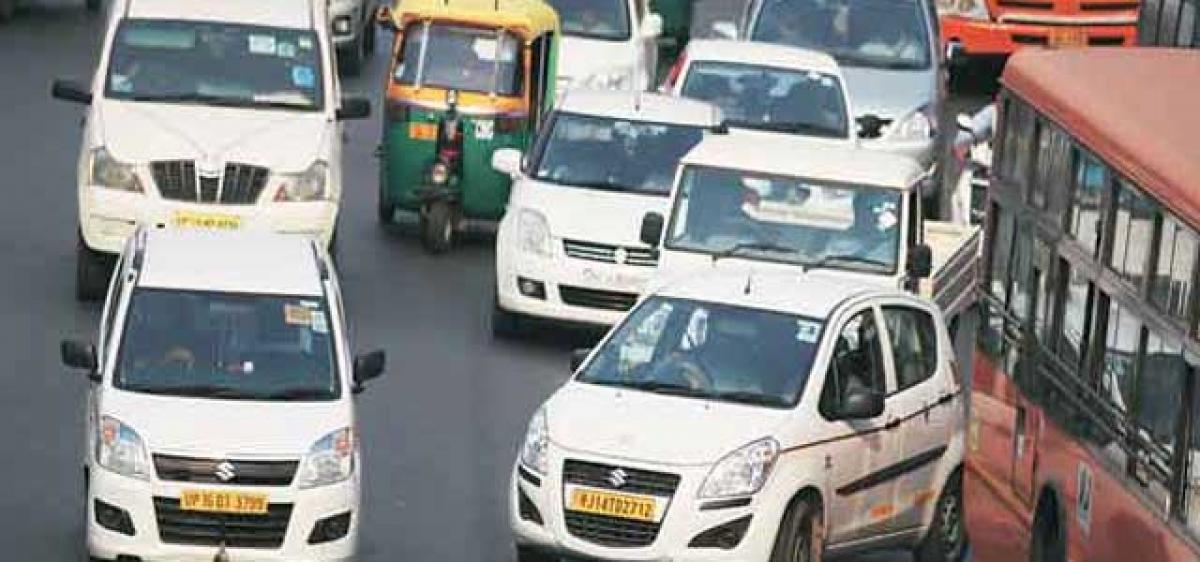Live
- VIP Treatment: Exclusive Benefits for High Rollers in Online Casino
- LS polls: Union Minister Bhagwanth Khuba, Dingaleshwara seer, Priyanka Jarkiholi file nominations in K'taka
- Amid show of strength, Congress’ Praniti Shinde files nomination from Solapur
- Tamil Nadu Police gives clean report to Isha Foundation in missing volunteers case
- Home Minister Amit Shah to address public meeting in Goa on April 24
- Gurgaon Open: M Dharma fires 67 for two-shot lead on penultimate day
- Sharad Pawar made many attempts to finish Shiv Sena, claims Maha minister
- Former England opener Raman Subba Row dies aged 92
- IPL 2024: Impact player rule is affecting the progress of half all-rounders, says Zaheer Khan
- ‘Teppa samudram’ review: Entertains with twists and turns
Just In

The draft taxi policy issued by the Government of India is likely to have adverse affect on the Telangana State Road Transport Corporation (TSRTC).
Tough competition from pvt operators may push corporation to corner
Hyderabad: The draft taxi policy issued by the Government of India is likely to have adverse affect on the Telangana State Road Transport Corporation (TSRTC).
Experts opine that the draft policy would take away the advantage the corporation had so far in terms of carrying passengers as a stage carriage.
There would be a tough competition not only from private bus operators but also from cab operators, all India tourist permit taxis and 16-seater mini buses.
TSRTC Staff & Workers Federation general secretary V S Rao said that what is worse was that the state government seems to have favoured the system even though it is yet to become an Act.
While the information technology companies were running cabs on sharing basis, the government has now permitted two-wheeler taxi service. The Chief Minister himself flagged off the service offered by Uber recently.
The draft policy also proposes penalty point system for traffic violations and increasing fee of the transport services.
The RTC drivers are constantly under pressure to maintain time schedules and in the process if they unintentionally jump the signal couple of times they stand to lose their licence, said V S Rao.
“If that happens, they will have to wait for two years before getting another licence. This would rob them of their livelihood.
Introducing such rules without improving basic infrastructural facilities and educating people on proper methods of driving would lead to several problems among workers,” he said.
Former director of Central Institute of Road Transport (CIRT) Ch Hanumanth Rao said that since the Centre appears to have decided to amend the Act and come up with a new policy, the TSRTC should gear up to the change and draw strategies to meet the challenges or else it would suffer heavy losses.
Speaking to The Hans India, Hanumanth Rao said that the main reason for people opting for private operators was that they go to the doorstep of the passengers and offer several comforts like onboard wi-fi, money wallets for easy payments and air-conditioned facility at affordable rates.
The employees of the corporation, who have been catering to about 85 percent of the people so far, should adopt to new technology and provide better services if they have to survive in the competitive market.
The employees, who have been fighting for their salaries and rights, should now put in efforts to save the public transport system from collapse, Rao said.
Telangana Mazdoor Union (TMU) leader P Ashwadhama Reddy said that they would take up massive protests if such move was made by the Centre.
“We have successfully taken up protests and programmes against proposed amendments in the Motor Vehicle Act by the Centre. If a decision is taken against the interests of RTC, the TMU would lead the agitation,” said Ashwadhama Reddy.
RTC MD G V Ramana Rao said that they have no information about the provision of stage carriage for taxis. “The Centre had proposed to streamline the taxis and sought suggestions from all the states. We have also given our objections on different subjects,” he added.
Asked about the likely impact on TSRTC if such a provision was made, he said it was hypothetical question.
CITU leader Venkatesh said that the government needs to come to the rescue of the TSRTC and strengthen the public transport system in such way that it would be able to meet the new challenges.

© 2024 Hyderabad Media House Limited/The Hans India. All rights reserved. Powered by hocalwire.com







